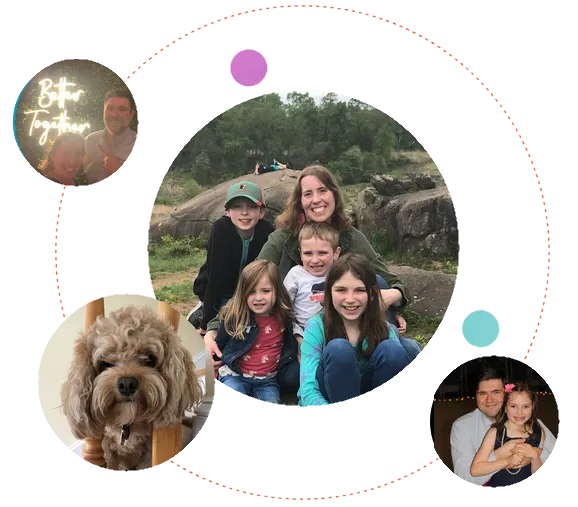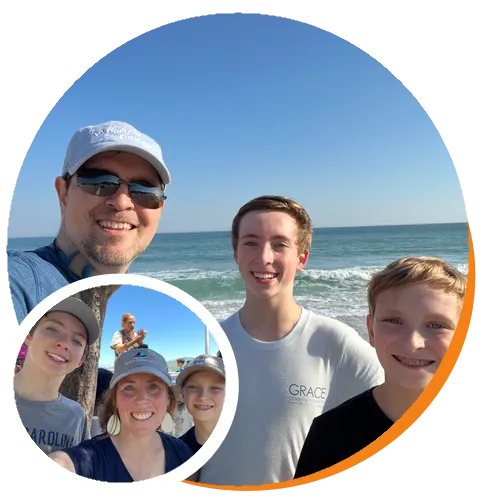
Wherefore seeing we are composed by such a great cloud of witnesses let us lay aside every weight and the sins that so easily entangle us, looking to Jesus, the author and perfecter of our faith. - Hebrews 12:1-3
Who I am.
I work to practice the golden rule. I strive to be second because relationships matter and people come first. I'm a Christian, husband, dad, wearer of colorful socks, teller of dad jokes, outdoor enthusiast, business owner, insurance agent and I serve my clients as their insurance broker with the Adair Agency. I'm a growing listener, storyteller, and blessed beyond words.
Who I Am and What We Do
What I do.
I very imperfectly worship Jesus who changed my life about 30 years ago. I get to spend life with my best friend Olivia who married me 20 years ago. I have been a dad to four amazing kids for over a decade and a half. It may be why my beard has more grey than black now. :)
I and my wife are actively building our insurance agency. We call it the Adair Agency. Olivia is a homeschooling mom to our four kids, my business partner, and a former child and family therapist. We work together as insurance agency owners after I served 20 years in bi-vocational ministry.
After covid happened, we needed a pivot and for a while I day-traded. I did that for a year but it was turning me into a person I did not want to be. I ended up building an insurance company after my dad passed away, that story is below. Now, I do two things. I help clients get covered with customized insurance options. I encourage the right people to discover the career that they were meant to excel in, build passive income, and most importantly we help families solve their problems with life insurance.
Our agency specializes in debt-free life, living benefit insurance that covers health/disability, infinite banking including children’s smart starts, mortgage protection, and retirement solutions including IULs and annuities.
I am a constant learner. I’m a veracious reader. My other vocational training is in Christian ministry where I have a Master’s Degree in Theological Studies. A few of the other vocational things I have done includes working in a non-profit, running an IT company, billing a few million in state sponsored insurance for a non-profit, and helping families from a wide variety of backgrounds.
If you want my curriculum vitae then check out my LinkedIn.
I’m a listener, leader, entrepreneur, and advocate for families.
The things that I do come from the person that I am at my core. One of the things that makes me who I am is my faith in Jesus. He teaches me that life is a gift that has an end date. I consider myself second even in the story of my life. Jesus inspires me to strive to daily be the best version of myself, the grace of God to adjust where I fall short, and the humor to put things in perspective. God's love challenges me to love my neighbor and build a better world. I’ve lived across the Northeast and the Southeast of the USA. We now make our home in the greater Wilmington NC area but help clients from NC to CA.
I tell dad joke, it’s a dad joke when it becomes apparent.
I also slow dance in the kitchen with my wife whenever I get the opportunity. I try not to step on her toes.
Want to get to know me?
PREPARING FOR TOMORROW
FAMILY FOCUSED APPROACH
My life has revolved around helping families. I now just do it by providing life insurance options. I’m a husband, dad to four kids, and owner of one crazy cavapoo. It seems like we are always on the go. I strive to do what is best for any family that I get the opportunity to connect. It’s how to be a good neighbor.


We help you protect your family
We use insurance to provide assurance for the financial impact of their life after our deaths.

We train and equip agents to put clients first
We believe relationships matter and people come first. We help our agents find their extraordinary.

We have fun and get things done.
We put family first. We own our business so our job is to serve clients and balance living a life of joy.
200k+
Average life insurance policy size.
10+
Growing agents on the team.
20+min
applying to approval.
4+
Years helping our list clients.

Why The Insurance Industry?
My Insurance Story
Most kids don’t dream of growing up to be insurance agents. When I was a kids I wanted to be Spider-man but that job was already taken. I initially got into the insurance industry after my dad unexpectedly died. He had a life insurance policy for years with a large national company. After he hit a certain age the company that sold it to him didn’t give him his best options and even told him the benefits had decreased so much that he should just drop the policy.
Thankfully because that policy was kept in place when he unexpectedly died, it provided for my mother that was not only emotionally distressed but would have been financially devastated without the benefits of that policy. The more I learned about the industry, the more I realized how much good it can do for families. I also decided that I wanted to be a part of making it better.
I wanted to provide a better option for people like me that at first are clueless about insurance. Insurance like any other industry is filled with lingo and intricacies that most people just don’t know. I knew that I could make a difference through passion and compassion with potential clients. Here are some of our 5-Star reviews from our satisfied clients. I want me and our agents to make it a better industry by helping one family at a time. We hope yours will be the next family we help.

Will Adair
Agency Owner
Life insurance is not primarily about us. It is about the people that you love. We all have an expiration date. We just don't know the when or the how. We use insurance to leave our families with something extra for when we are not there with them.


FAQ
Frequently Asked Questions
How do you pronounce your name?
Willis is pronounced Will-is like in "What you talkin' bout Willis. adairs.link/whatyou Adair is pronounced A like in Eh (think Canada) dare (like in I dare you not to laugh).
What I do as an insurance agent?
I listen. I learn. I lead. I listen to people because everyone is valuable. I learn what others need and work to get them where they want to go. I lead because that is privilege as the servant leader at the Adair Agency. Looking for coverage to protect yourself and those you love? Reach out. Learn more at https://adairagency.com/home
What is mortgage protection?
It is a life insurance policy for home owners. Generally if healthy, it comes with living benefits and death benefits. Learn more at https://adairagency.com/mortgage
What are living benefits?
Traditional insurance pays out when you die. Living benefits generally have both death benefit for your beneficiary and living benefits that pay out to you while living. Learn more at https://adairagency.com/livingbenefits
What is Debt Free Life?
It is a program that we offer through a corporate partner. We can generally get people out of debt without paying anything extra. Learn more at https://adairagency.com/debtfreelife
Help with retirement?
Planning for retirement, whether that's five years away or 25 years down the road, is something each of us needs to consider. Learn more at https://adairagency.com/retirement

Want to work with us?
We are now hiring people like you with passion and compassion for both full time and part time work.
We look for good people be they service sector, teachers, pastors, stay at home parents, and/or people with entrepreneurial spirits looking for their opportunity.
Quick Links
Legal
Contact Us
© Adair Agents Services. 2020 - 2025 All Rights Reserved.
